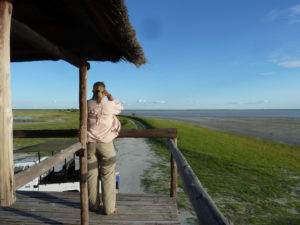
“I think the university as an institution is at a pivotal moment.”
After 25 years as a professor in the department of Ecosystem Science and Sustainability, Melinda Laituri finds her own pivotal moment as she retires from Colorado State University this fall.
“I think for myself, this is a good moment to step away,” Laituri said. “… to do some of the things I want to do as the institution will face some really significant changes, [as the pandemic pushes the] institution into different things that will change the nature of the of the university.”
Since the start of her career at CSU in 1995, Laituri has witnessed transformations throughout the Warner College and has been empowered to spearhead projects involving her passions of GIS and watershed science. This is most evident in her role as founder and director of the Geospatial Centroid at CSU, a center to promote and support spatial thinking and geospatial technologies in research, teaching and projects for the campus and the community.
She also has taken a role in supporting equity and activism in her field. For instance, when she held the position of Associate Dean of Academic Affairs at Warner College from 2006-2008, she was a part of the founding group for creating the Environmental Justice Working Group, whose mission is to create space for engaged interdisciplinary scholarship, training and teaching and community-building around issues of environmental injustice.
An adventurous career
Other accolades include the titles of a Fulbright Scholar, a Rachel Carlson Fellow, as well as a Jefferson Science Fellow with the Department of State. The latter enabled her to take opportunities abroad, as well.
After becoming a Jefferson Science Fellow, she was the principal investigator on the Secondary Cities Initiative to help map and assist in exploring under-examined cities. This project took her to over 20 different countries, but she affirms that geography is a specialty that connects people and their experiences.
“[CSU] has enabled me to do a lot of different things, I really appreciate that opportunity,” she said. “Geography is one of those disciplines that builds bridges.”
As she reflected on her time at Warner, Laituri recalled the fond memories she has at the CSU Mountain Campus and the colleagues who have helped shape her experience as a CSU and Warner Ram.
“Being able meet these amazing people who have very little to work with but are able to figure out ways to collect geospatial data to solve problems and see [how] the future leaders of tomorrow solve some of these big problems.”
Robert “Rocky” Coleman has been an instructor in the Warner College for over 35 years and can recount Laituri’s first year at CSU, and even later found out that they attended the same high school together.
“Whether as a teacher, an adviser, a researcher or an administrator, her focus has always been her students, and the education of all,” Coleman said. “I have valued her as an essential coworker and will continue to cherish her as a lifelong friend.”
Laituri’s peers also revere her as someone who has been a consistent helping hand as well as trailblazer, including fellow ESS professor, Steven Fassnacht.
“Melinda always has a positive attitude,” Fassnacht said. “This opened doors for many other people as she was willing to take the lead, help out or just consult.”
Giving others a seat at the table
Although her chapter at CSU is coming to an end, she will continue to work with the U.S. State Department as principal investigator for the city’s COVID-19 Mapping and Mitigation program, examining how communities are impacted and recover during the pandemic.
Looking back 25 years ago when Laituri was one of just few women in the department, to where her career has taken her now, her legacy at CSU is one of passion, advocacy and fortitude.
“The important thing is figure out ways to give people voice, to give them a place at the table,” she said. “We need to step up and understand what that means, and I think it’s a good time to step back and let other people lead the way and make things happen.”